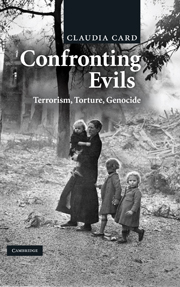Book contents
- Frontmatter
- Contents
- Preface and acknowledgements
- List of acronyms and abbreviations
- PART I The concept of evil
- PART II Terrorism, torture, genocide
- 5 Counterterrorism
- 6 Low-profile terrorism
- 7 Conscientious torture?
- 8 Ordinary torture
- 9 Genocide is social death
- 10 Genocide by forced impregnation
- Bibliography
- List of films referred to
- List of websites for international documents
- Index
10 - Genocide by forced impregnation
Published online by Cambridge University Press: 05 June 2012
- Frontmatter
- Contents
- Preface and acknowledgements
- List of acronyms and abbreviations
- PART I The concept of evil
- PART II Terrorism, torture, genocide
- 5 Counterterrorism
- 6 Low-profile terrorism
- 7 Conscientious torture?
- 8 Ordinary torture
- 9 Genocide is social death
- 10 Genocide by forced impregnation
- Bibliography
- List of films referred to
- List of websites for international documents
- Index
Summary
How can rape, forced pregnancy, and resultant childbirths, the production of new persons, be genocide, the annihilation of a people? (Allen 1996, p. 92)
A PARADOX
It was argued in chapter 6 that rape can be terrorist and in chapter 8 that it can be torture. Drawing on the understanding of genocide as social death, this chapter examines the idea that mass rape, even when aimed at forced pregnancy and births, can be a strategy of genocide. It is not difficult to see how rape can be a terrorist practice and at the same time torture. It may be less obvious that mass rape can be genocidal, especially when it is aimed at mass impregnation. International documents mention rape explicitly as a violation of human rights. The Fourth Geneva Convention of 1949 states, “Women shall be especially protected against any attack on their honour, in particular against rape, enforced prostitution, or any form of indecent assault” (Human Rights Watch 1996, p. 30, n. 46). The International Committee of the Red Cross (ICRC) considers rape to be among the grave breaches specified by that convention (Human Rights Watch 1996, p. 30, n. 46). In 1995 Justice Richard Goldstone, Prosecutor for the International Criminal Tribunal for the Former Yugoslavia (ICTY), affirmed that rape can constitute torture (Human Rights Watch 1996, p. 32). The ICTY at The Hague and the International Criminal Tribunal for Rwanda (ICTR) at Arusha explicitly include rape among crimes against humanity (Gutman and Rieff 1999, p. 108).
- Type
- Chapter
- Information
- Confronting EvilsTerrorism, Torture, Genocide, pp. 267 - 293Publisher: Cambridge University PressPrint publication year: 2010



